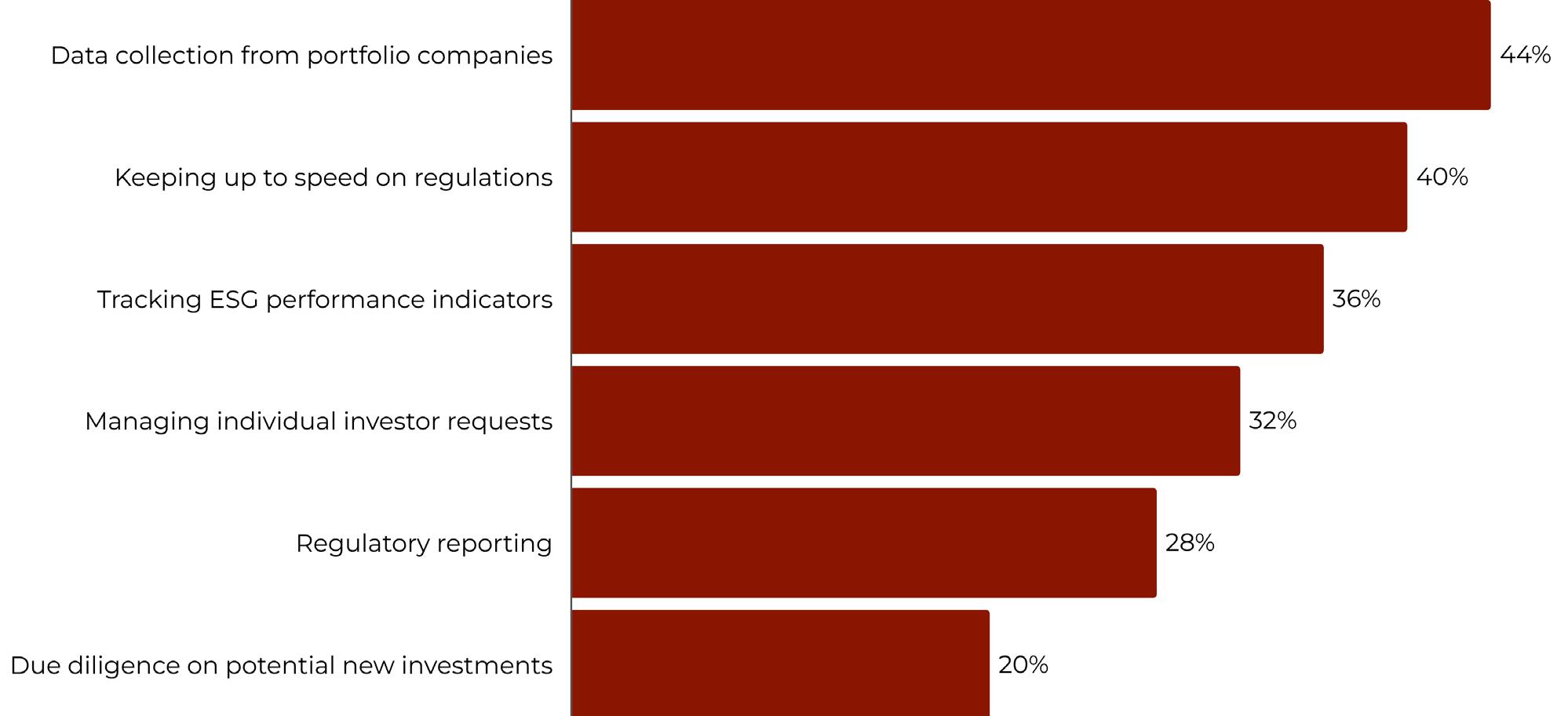




Private markets’ journey from defensive to proactive sustainable investing
• Operational demands for ESG vary by region and asset class
• Innovation in value creation is the next growth frontier for ESG
Private markets have long favoured active asset management, making them a natural ground for sustainable investing that aligns with longterm value creation. However, the evolution of ESG has been repeatedly tested by regulatory inconsistency, economic volatility and political scrutiny. As a result, a clear gap has emerged between what ESG teams within private markets aim to achieve and what consumes most of their time.
A significant example is the process of collecting data from portfolio companies, which, according to our latest survey of private market managers, takes up the most bandwidth (see Figure 1).
Establishing effective sustainability performance metrics for a portfolio company can be challenging, and collecting the necessary data to track these indicators adds to the burden for both the asset and the manager. The process is often demanding, highlighting the need for more streamlined solutions.
Scale enhances the challenge. Our data shows that 80% of managers with more than $10bn in assets under management cite data collection as a key concern, compared to 35% of managers with smaller portfolios.
The second biggest challenge for ESG teams is tracking the changing regulatory landscape. In Europe, the Sustainable Finance Disclosure Regulation (SFDR) is being updated, with more proposals expected in this quarter. Meanwhile, in the United States, regulations vary from state to state. 50% of European firms say regulatory monitoring takes up most of their time, compared to 20% in North America, where tracking sustainability KPIs is a far bigger consideration, cited by 60% of firms.
Both idiosyncratic reporting for investors (32%) and regimented reporting for regulators (28%) consume significant resources, while only onefifth of respondents report devoting considerable time to due diligence for new deals.
Resource allocation differs by asset class, with data collection being the most time-consuming activity across various strategies. For buyout firms, performance tracking ranks as the next biggest operational task, while tracking regulations is the second primary focus for private credit and real estate managers. Infrastructure firms often spend a significant amount of time

managing individual investor requests. Notably, due diligence did not feature in any of the topconsideration lists.
These findings reflect a broader focus on the defensive aspects of ESG, indicating that much remains to be achieved in proactive sustainable investing. Comprehensive ESG due diligence can shape a strategic value creation plan from the outset, leading to more measurable sustainability outcomes at the portfolio level.
That represents the ideal goal for sustainable investing, a target that many firms aim to achieve, based on our data (see Figure 2). Adopting a more value-driven approach that delivers financial results is crucial for the success of ESG, especially in a time of increased scrutiny.
Private markets play a pivotal role in financing global megatrends, such as digital transformation, the energy transition, ageing populations and supply chain realignment, among others. Sustainable investing is key to achieving these goals, but faces challenges in the form of measuring financial performance, aligning priorities and adhering to stricter reporting requirements (see Figure 3). A more proactive approach to ESG could help address many of these challenges.
“Most investment managers want to move toward proactive, value-driven strategies, but are held back by fragmented data systems and shifting regulatory or stakeholder demands,” says Alessandro Casoli, Head of UK Advisory at Holtara.
“Our approach focuses on enabling a behavioural shift. By combining a scalable data collection platform with targeted advisory support across the investment lifecycle, we help streamline ESG data workflows and unlock capacity for strategic sustainability initiatives; whether that’s integrating ESG into due diligence or identifying value creation opportunities across portfolios.”
“Private markets have a unique opportunity to shape the future of sustainable investing. But to do so, ESG must become less about compliance and more about clarity, consistency, and value creation. That is the direction we see the industry moving in and one we are committed to supporting.”






